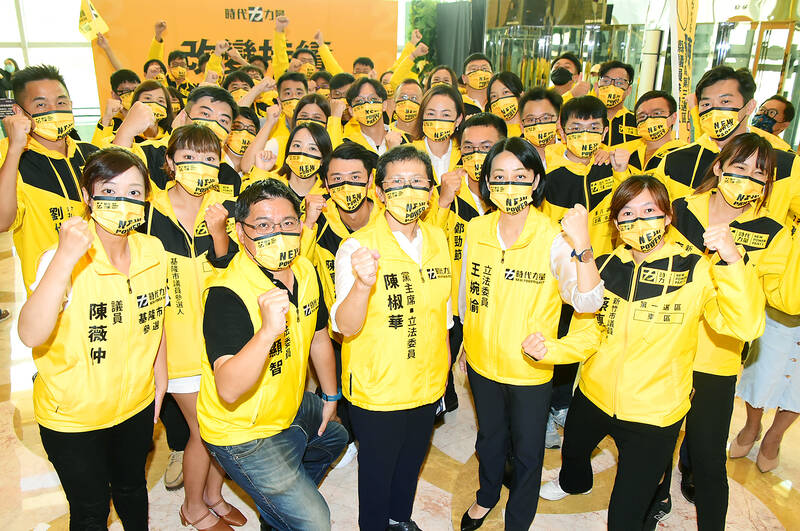Taiwanese Internet celebrity Chung Wei-ting (仲惟鼎), also known as AmoGood (古阿莫), yesterday failed in his bid to become a member of the New Power Party’s (NPP) central decisionmaking committee.
The result has thwarted his plan to run for chairman of the party.
“It is a pity that I cannot contribute to the reform of the party. However, I am still an NPP member and there are still government and party jobs at the local level,” Chung said. “I will continue to oversee the government and work hard for Taiwan.”

Photo: Hu Shun-hsiang, Taipei Times
“I ran in the election for the NPP’s central decisionmaking committee because I want Taiwanese to see and understand the party,” Chung said in a statement, adding that he hopes newly elected committee members make great strides for the party.
Chung, who is known for his irreverent movie reviews, has more than 10 million subscribers on Sina Weibo and 2 million on Bilibili. The two Chinese social media sites have since Feb. 4 blocked him from accessing his accounts after he announced his bid to enter Taiwanese politics.
As being a committee member qualifies an NPP member to run for chairperson, Chung said previously he would run if the party was lacking good leaders.
Prior to the election, Chung said he entered politics because he wanted to make contributions to Taiwanese society, and he joined the NPP because it allows an ordinary party member like him to participate in the election for members of the central decisionmaking committee.
Chung was one of the 29 party members vying for 15 spots on the committee, the NPP said, adding that 827 members voted in the election, representing 75 percent of the membership.
NPP Chairwoman and Legislator Chen Jiau-hua (陳椒華), former Miaoli commissioner candidate Sung Kuo-ting (宋國鼎), NPP Secretary-General Christy Pai (白卿芬), and legislators Claire Wang (王婉諭) and Chiu Hsien-chih (邱顯智) were elected to the committee.
Sung garnered the highest votes among all 15 members, the NPP said.

POSITIVE DEVELOPMENT: Japan and the US are expected to hold in-depth discussions on Taiwan-related issues during the meeting next month, Japanese sources said The holding of a Japan-US leaders’ meeting ahead of US President Donald Trump’s visit to China is positive news for Taiwan, former Japan-Taiwan Exchange Association representative Hiroyasu Izumi said yesterday. After the Liberal Democratic Party’s landslide victory in Japan’s House of Representatives election, Japanese Prime Minister Sanae Takaichi is scheduled to visit the US next month, where she is to meet with Trump ahead of the US president’s planned visit to China from March 31 to April 2 for a meeting with Chinese President Xi Jinping (習近平). Japan and the US are expected to hold in-depth discussions on Taiwan-related issues during the

‘LIKE-MINDED PARTNER’: Tako van Popta said it would be inappropriate to delay signing the deal with Taiwan because of China, adding he would promote the issue Canadian senators have stressed Taiwan’s importance for international trade and expressed enthusiasm for ensuring the Taiwan-Canada trade cooperation framework agreement is implemented this year. Representative to Canada Harry Tseng (曾厚仁) in an interview with the Central News Agency (CNA) said he was increasingly uneasy about Ottawa’s delays in signing the agreement, especially as Ottawa has warmed toward Beijing. There are “no negotiations left. Not only [is it] initialed, we have three versions of the text ready: English, French and Mandarin,” Tseng said. “That tells you how close we are to the final signature.” Tseng said that he hoped Canadian Prime Minister Mark Carney

Taiwan has received more than US$70 million in royalties as of the end of last year from developing the F-16V jet as countries worldwide purchase or upgrade to this popular model, government and military officials said on Saturday. Taiwan funded the development of the F-16V jet and ended up the sole investor as other countries withdrew from the program. Now the F-16V is increasingly popular and countries must pay Taiwan a percentage in royalties when they purchase new F-16V aircraft or upgrade older F-16 models. The next five years are expected to be the peak for these royalties, with Taiwan potentially earning

President William Lai (賴清德) yesterday bestowed one of Taiwan’s highest honors on Saint Vincent and the Grenadines (SVG) Ambassador Andrea Clare Bowman in recognition of her contributions to bilateral ties. “By conferring the Order of Brilliant Star with Grand Cordon on Ambassador Bowman today, I want to sincerely thank her, on behalf of the Taiwanese people, for her outstanding contribution to deepening diplomatic ties between Taiwan and SVG,” Lai said at a ceremony held at the Presidential Office in Taipei. He noted that Bowman became SVG’s first ambassador to Taiwan in 2019 and